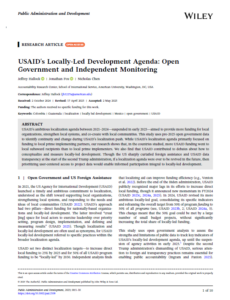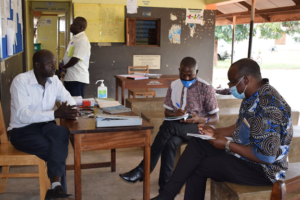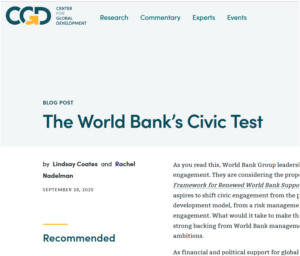Overview
ARC’s work on monitoring and learning from civic engagement in development aid initially focused on the World Bank. Since 2017, this has combined: firstly, sustained policy dialogue with World Bank decisionmakers; secondly, civil society coalition-building; thirdly, technical accompaniment for CSO-led monitoring of World Bank-funded projects; fourthly, research to inform the advocacy objectives of our partners; and finally, building alliances with champions of civic engagement within the World Bank. The evolution and growth of our strategic approach has enabled civic actors to hold this powerful institution accountable.
This area of work has expanded to include other aid institutions, including from 2021-2025 a body of work on using open data to understand the implementation of USAID’s then commitment to localization.
Featured publications
Will the World Bank’s “Citizens at the Center” mean bold engagement or compliance at the margins? In their September 2025 blog for the Center for Global Development, Lindsay Coates and Rachel Nadelman ask what it would take to shift civic engagement from the periphery to the center of the bank’s development model, from a risk management mindset to meaningful community engagement.

In 2021, USAID pledged to raise the proportion of its direct funding going to national organizations, and to involve “locally led” input. In USAID’s Locally-Led Development Agenda: Open Government and Independent Monitoring, Jeffrey Hallock, Jonathan Fox, and Nick Chen analyze USAID’s uneven progress towards locally-led development in Colombia, Guatemala, and Mexico, showing which types of organizations received direct local funding, and how much of it was disbursed through subawards.
.
Activities
1. Facilitating sustained policy dialogue with the World Bank
Since 2018, ARC has facilitated a working group that brings together World Bank staff and CSOs to address institutional transparency on stakeholder and civic engagement in projects. The working group began with ad-hoc meetings on subjects selected by Bank staff. Subsequently, it has become a sustained, co-designed dialogue that tackles priority and sometimes contentious sustainable development concerns. ARC’s role as a university-based action research center has allowed it to facilitate discussion of sensitive issues among members with diverse perspectives and agendas. Subjects have included: how to maintain meaningful engagement when closing civic space means it leads to reprisals and retaliations; assessing the useability and impact of project-based grievance redress mechanisms; and blind spots in the Bank’s fulfillment of its access to information commitments.
The working group prioritizes meaningful and consistent inclusion of stakeholders from the global South. At the same time, it leverages its consistent institutional access to deliver on tangible advocacy goals.
Civil society members of the joint working group include: Accountability Counsel, Accountability Lab, Arab Watch Coalition, Bank Information Center, Coalition for Human Rights in Development, Freedom House, Kwantu, Nomo Gaia, Oxfam International, Partnership for Transparency Fund, Trust, Accountability and Inclusion collaborative, and Urgewald.
2. ‘Locally-led’ development, open government, and USAID funding
In 2021, USAID pledged to significantly increase the proportion of its funding that went to ‘national’ organizations, and to include more ‘locally-led’ input. Informed engagement by national and local civil society stakeholders required an understanding of USAID funding priorities and trends; this in turn required open government and data. Based on earlier work in Honduras, in 2024 ARC used public sources of official data to assess USAID’s disclosure practices, trace its sectoral priorities, and identify patterns of localization. Learn more about the findings on our Locally Led Development and Open Government: Focus on USAID page.
3. Collaborative CSO monitoring and advocacy for institutional change at the World Bank
ARC provides accompaniment and technical support to Southern CSOs to independently monitor World Bank project implementation and use the findings. This collaborative effort has three aims. Firstly, it seeks to create positive change at the project level. Secondly, it supports partners to engage effectively with government. Thirdly, it brings Southern-led experience to influence high-level learning and policy dialogue.

Africa Freedom of Information Centre (AFIC) interviewing Ugandan Health Ministry staff as part of a joint ARC-AFIC World Bank citizen engagement project monitoring. Photo: Ruth Namara,
4. The Sandra N. Smithey Fellowship for Equity and Accountability in International Development
In May 2023, ARC launched a fellowship program sponsored by Charles Stewart Mott Foundation, Wallace Global Fund and Marin Community Trust. The Sandra N. Smithey Fellowship for Equity and Accountability in International Development is supporting changemakers from the global South. Fellows are frontline advocates, organizers, scholar-activists, and community leaders whose work advances the kind of environmentally and socially sustainable development that Sandra, an environment progam officer for the Mott Foundation, championed.
By late 2025, eight fellows – frontline advocates from Bangladesh, Cambodia, Cameroon, Colombia, Haiti, Nepal, Peru, and Tanzania – had completed their programs. Each fellow addressed issues related to development finance in their home country.
5. Independent action research on World Bank trends
ARC pursues in-depth, independent research on institutional and project-based World Bank processes intended to support citizen engagement. This research aims to contribute to the knowledge base that will strengthen partners and networks. One study examined whether and how the Bank fulfils its commitments to citizen engagement in practice. Another looked at the incentives and constraints facing Bank staff charged with community engagement. A third asked whether outlier World Bank projects contributed to enabling environments for civic engagement.
For a full list of ARC’s publications in this area, see related resources below.
Collaborators
- ARC research professor (asst.) Rachel Nadelman leads our work on development finance and civic engagement. She co-convenes the ongoing World Bank-civil society dialogue, as well as providing strategic support to our partners. She is the principal investigator on a several pieces of research.
- ARC director Jonathan Fox worked with Jeffrey Hallock to use open data to analyze US development programming (2012-25); he also provides support to the whole program.
- In Colombia, ARC researcher Mariana Cepeda leads on monitoring citizen engagement and accountability in multilateral development bank projects in Afro-Colombian communities that are historically marginalized and underserved.
- ARC research professor Judy Gearhart’s work makes the link between workers’ rights and development finance in the cocoa and fishing industries. She is also a member of the Board of Directors at the Bank Information Center.
Sponsors have included UK Aid (through the Action for Empowerment and Accountability research program), the Open Society Foundations, the Charles Stewart Mott Foundation, and the Wallace Global Fund.
Related Resources
2025
The World Bank and Shrinking Civic Space, book chapter, Rachel Nadelman and Ricardo Vergel Negrón, published in “The Elgar Companion to the World Bank,” edited by Antje Vetterlein and Tobais Shcmidtke
USAID’s Locally-Led Development Agenda: Open Government and Independent Monitoring, article, Public Administration and Development, Jeff Hallock, Jonathan Fox, and Nick Chen
2024
After the Agreement: Implementing Remedy for Displacement in Northern Haiti, Accountability Note, Scott Freeman, Lani Inverarity, and Megan Pearson (also in Spanish and Kreyol)
Is The World Bank Rolling Back Commitments to Citizen and Civil Society Engagement, Again?, article, Bretton Woods Project At Issue, Rachel Nadelman
Open Government and US Development Cooperation in Colombia: Lessons for Locally-Led Development, journal article, Development Policy Review, Jonathan Fox and Jeffrey Hallock
2023
How More Open Goverment Can Bolster USAID’s Localization Agenda, blog, From Poverty To Power (Oxfam), Jonathan Fox and Jeffrey Hallock
World Bank’s Evolution Process Must Prioritize Civic Space and Participation, letter from 65 CSOs submitted to the World Bank
Struggles for Accountability in the 2022 Cost-of-living Crisis, Accountability Brief, ARC, Naomi Hossain and Jeffrey Hallock
Food and Energy Protests Signal Failures of Accountability on a Global Scale, blog, From Poverty to Power (Oxfam), Naomi Hossain and Jeffrey Hallock
2022
International Aid Actions for Accountability: Identifying Interaction Effects Between Programmes, journal article, Development Policy Review, (Rachel Nadelman, Rosie McGee, Ayesha Khan, Euclides Gonçalves, Jonathan Fox, Richard Burge, Fatai A. Aremu, Colin Anderson, 2022)
Shrinking Civic Space: How Can the World Bank Respond?, blog, Oxfam International (Rachel Nadelman, Christian Donaldson, and Katelyn Gallagher, October 2022)
Civic Space and Reprisals Risks: Missing Elements in the Assessment of Development Projects, panel at World Bank/IMF Annual Meetings Civil Society Policy Forum (moderator: Rachel Vernon; panelists: Rachel Nadelman, Ruslan Myatiev, Maninder S. Gill, October 2022)
Civic Space: The Missing Element in the World Bank’s Country Engagement Approach, Oxfam Briefing Paper (Christian Donaldson, Katelyn Gallagher, and Rachel Nadelman, 2022)
Grievance Redress Mechanisms in the Public Sector: A Literature Review, background paper for The Skeptics Guide to Open Government, Open Government Partnership (Suchi Pande and Naomi Hossain, 2022)
El control social en Colombia: Un balance sobre las veedurías ciudadanas, Accountability Working Paper, ARC (Mariana Cepeda, 2022)
Seeing the Combined Effects of Aid Programmes, IDS Policy Briefing (Richard Burge, Rachel Nadelman, Rosemary McGee, Jonathan Fox and Colin Anderson, 2022)
Participatory Oversight Institutions, webpage, ARC (2022)
Indigenous Rights, Safeguards, and Conflict Resolution: Successes, Failures and Lessons from Three World Bank Projects, World Bank/IMF Spring Meetings Civil Society Policy Forum (moderator: Rachel Nadelman; panelists: Mario Paniagua, Roberto Espinoza, Carolina Juaneda, Gabriel Quijandría, Kennan Papp, Dianna Pizarro, Angela Caballero Espinoza, April 2022)
2021
How Can the World Bank Reduce Child Labor and Farmer Poverty with its Proposed Côte d’Ivoire Cocoa Project? blog, Bank Information Center (Sofia Dinn with Judy Gearhart, 2021)
Environmental and Social Framework Implementation in Latin America, panel at World Bank/IMF Annual Meetings Civil Society Policy Forum (moderator: Rachel Nadelman; panelists: Laura Montaño, Carolina Juaneda, Marivero del Mastro, Sofia Abreu Ferrerira, October 2021)
The World Bank Has Made High-level Commitments to Engaging Citizens—So Why is it Proving So Hard to Implement?, blog, LinkedIn (Naomi Hossain and Rachel Nadelman, 2021)
How Do World Bank Staff Perceive the Institutional Environment for Building Citizen Engagement into Projects?, Accountability Working Paper, ARC (Rachel Nadelman, 2021)
Citizen Engagement in Practice: Lessons From the Independent Monitoring of Citizen Engagement Implementation in World Bank-Funded Projects in Ghana, Malawi and Uganda, panel at World Bank/IMF Annual Meetings Civil Society Policy Forum (moderator: Rachel Nadelman; panelists: Beauty Emefa Narteh, Michael Kaiyatsa, Gilbert Sendugwa, Erik Caldwell Johnson, April 2021)
U.S. Foreign Assistance Portals are Inadequate to Assess Reform on Locally Led Development, blog, American University Center for Latin American and Latino Studies (Katerina Parsons, December 2021)
2020
How Do World Bank Projects Commit to Citizen Engagement?, Policy Briefing, Institute of Development Studies (Rachel Nadelman, 2020)
¿Cómo se comprometen los proyectos del Banco Mundial con la participación ciudadana? Policy Briefing, Institute of Development Studies (Rachel Nadelman, 2020)
Contested Terrain: International Development Projects and Countervailing Power for the Excluded, article, World Development (Jonathan Fox, 2020)
How Do Donor-led Empowerment and Accountability Activities Take Scale into Account? , IDS Working Paper (Colin Anderson, Jonathan Fox and John Gaventa, 2020)
2019
Citizen Engagement: An Independent Review of the World Bank’s Commitments in Design and Practice in Myanmar, report, ARC (Rachel Nadelman, Anjali Shah, Wunna Htun and Ha Le 2019)
How Does the World Bank Build Citizen Engagement Commitments into Project Design? Results from Pilot Assessments in Mozambique, Myanmar, Nigeria, and Pakistan, IDS Working Paper, Institute of Development Studies (Rachel Nadelman, Ha Le, and Anjali Sah 2019)
Citizen Engagement: An Independent Review of the World Bank’s Commitments in Pakistan, report, ARC (Anjali Shah and Rachel Nadelman 2019)
Citizen Engagement: An Independent Review of the World Bank’s Commitments in Mozambique, report, ARC (Ha Le, Rachel Nadelman, Anjali Sah, and Ian Evans 2019)
World Bank Citizen Engagement Assessment Tool (WB-CEAT) Version 4.0 (2019)
Citizen Engagement: An Independent Review of the World Bank’s Commitments in Nigeria, report, ARC (Rachel Nadelman, Ha Le, and Anjali Sah 2019)
2018
How a Community-Led Response to Sexual Exploitation in Uganda Led to Systemic World Bank Reform, Accountability Note (Elana Berger, 2018)
2017
Following the Money in Ghana: From the Grassroots to the Hallways of the IMF, Accountability Note (Abdulkarim Mohammed 2017)

